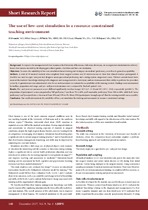The use of low-cost simulation in a resource-constrained teaching environment

View/
Date
2017Author
Mwandri, M.
Walsh, M.
Frantz, Jose M.
Delport, R.
Metadata
Show full item recordAbstract
BACKGROUND. To improve the management of chest trauma at the University of Botswana, Gaborone, Botswana, we incorporated simulation into a theorybased
chest trauma module by developing procedural guides, checklists and low-cost simulation.
OBJECTIVES. To assess the suitability of low-cost simulation-based training and its impact on students’ proficiency, as well as its general acceptability.
METHODS. A total of 39 medical students who completed their surgical rotation and 20 intern doctors in their first clinical rotation participated. A
checklist was used in a pre- and post-test design to assess procedural proficiency, and a rating system categorised scores. Thirteen content-based items
assessed the students’ knowledge relating to the diagnosis and management of a chest injury and one item assessed their ability to perform the procedure
correctly. A questionnaire was administered after the second assessment to evaluate the acceptability of the training module. Findings were summarised
by median, proportion and range, and pre- and post-test outcomes were compared by Student’s paired t-test.
RESULTS. Pre- and post-test assessment scores differed significantly (median (range) 11.3 (4.5 - 21.0) and 19.5 (15.5 - 23.0), respectively (p<0.001)). The
proportions of participants’ scores categorised as ‘full proficiency’ rose from 7% to 42%, and ‘reasonable proficiency’ from 30% to 60%, while both ‘some
proficiency’ and ‘poor proficiency’ decreased from 50% and 20% to 0%. Most (93%) participants ‘strongly agreed’ that the training module was acceptable.
CONCLUSION. Our results demonstrate the suitability of low-cost simulation for training and assessment in resource-constrained settings.
